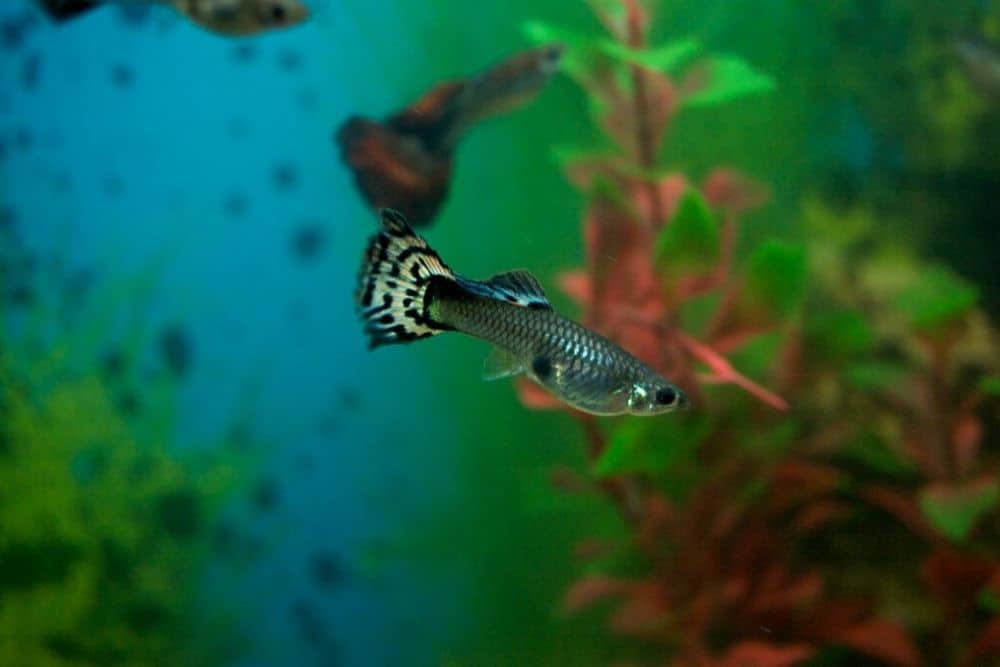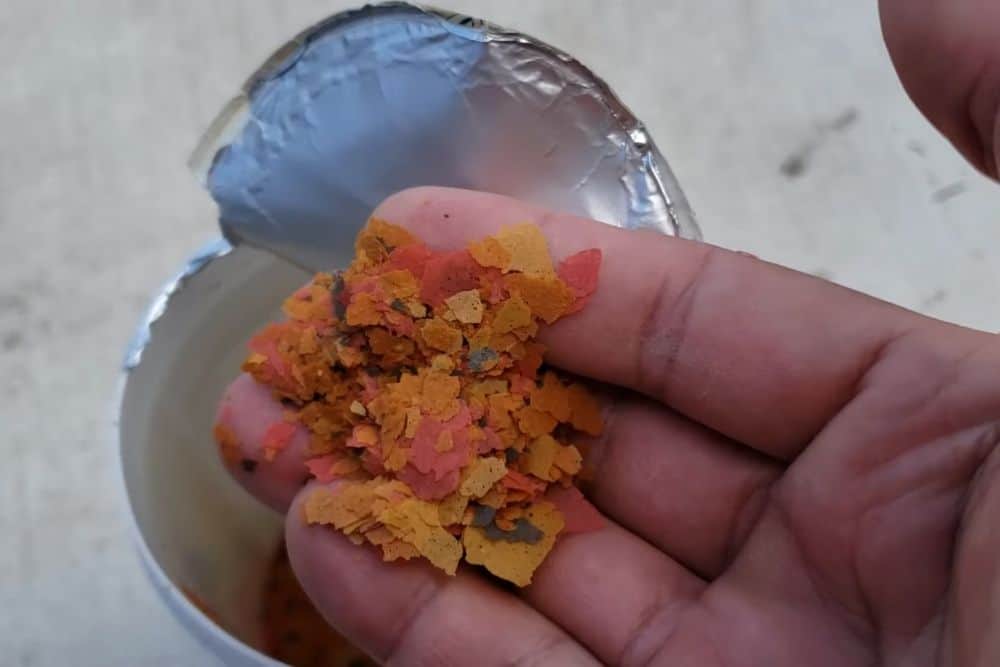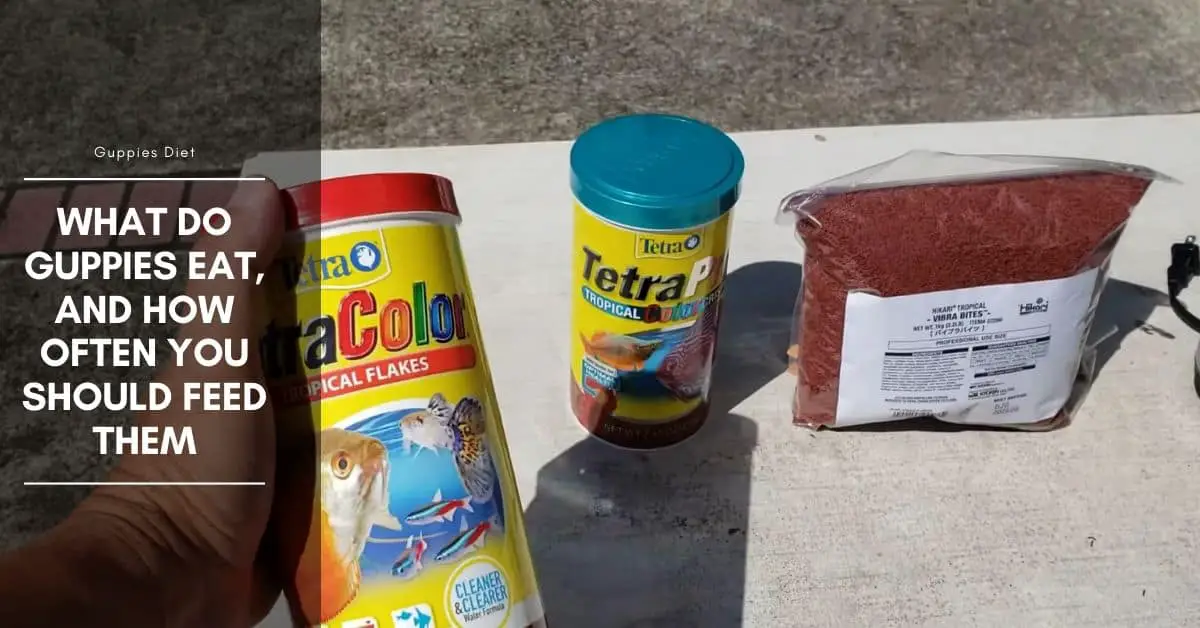There is a lot of information out there about keeping guppies and feed them. A lot of it is wrong, even some pet stores that ought to know better are giving out bad advice. Hopefully, this post will help you begin right and keep your guppy in good health.
Male guppies are the ones with the large pretty tails, and most people will prefer to keep them. Unless you want to breed guppies, you don’t need to get a female, in fact, if you get a female guppy you will end up breeding them. In some places, especially big-box pet stores, female guppies are even getting hard to find.
What is a guppy?
Guppies are small tropical fishes. Male guppies have a body length of about one inch (2.5 cm) not including their tail. Females two or three inches long (5-8 cm).
They are livebearers, meaning that rather than lay eggs, the female gives birth directly to living young. Generally, 25 – 50 babies are born in a brood, about once every thirty days. Many people don’t want to raise guppy babies, so don’t keep females. The females are also generally less brightly colored than the males.

There is no way to stop a female from having babies if she is kept with a male, and she can keep having babies for six or more months after she was last with a male guppy.
Fluval Plant 3.0 LED Planted Aquarium Lighting, 32 Watts, 24-34 Inches
Boyd Enterprises CPGNnano5 Chemi-Pure Green Nano 5 Pack Aquarium Filtration
5% OffFzone 1.2 Gal Nano Rimless Auqarium Low Iron Fish Tank NovaClear Ultra-White Translucent Glass Verso Series Nano Shallow Pond Levitating Floating Air Aquarium(A20C-H12)
$29.99 (as of July 13, 2024 17:55 GMT +03:00 - More infoProduct prices and availability are accurate as of the date/time indicated and are subject to change. Any price and availability information displayed on [relevant Amazon Site(s), as applicable] at the time of purchase will apply to the purchase of this product.)Guppies do not care for their young. Once they’re born, to their parents they’re just small wiggling things in the water, that look a lot like food for the guppy. This is what happens to most baby guppies in aquariums unless special precautions are taken.
How long do guppies live?
Guppies live for about 2 years. A really old guppy is a three-year-old. Most fish you might buy at a pet store are between three months and one year of age. So, assuming you keep your fish well and healthy, you can expect to keep your fish for one to two years. If yours lives longer, you’re really doing something right!
How do guppies breathe?
Like all fishes, guppies have gills. They take water in through their mouth and push it through two slits on the sides of their heads. Those slits lead to the gills between the mouth and the slits.
The gills act sort of like our lungs. They are thin tissues with lots of small blood vessels in them. As the water passes over the tissues, oxygen diffuses into the blood and carbon dioxide and other wastes leave the blood and get swept out through the gill slits. If you look very carefully, you may be able to see the pink lungs inside the gill slit.
If you watch a guppy closely you’ll see their gills covers moving.
What do guppies eat?
Guppies are carnivores and eat mostly meat. They prefer to eat small insects that fall into the water, so they spend a lot of time floating near the surface of the water, though they will explore all of the aquarium looking for anything that might be moving, including small fishes. In the wild they eat many mosquito larvae, which also spend their time at the surface of the water, but they eat lots of other things too.
In the aquarium, though, they will be happy to eat flake food or “guppy pellets”. Though some pet stores will tell you they “must” some special guppy food, they do just fine on other tropical fish food.

They will also eat frozen or live brine shrimp and bloodworms, though the live bloodworms are sometimes too big for them. Some of the brine shrimp are too big too, so if you want to feed brine shrimp to your guppies, get them baby brine shrimp or hatch your own. They will take these foods frozen or freeze-dried. Guppies are really not too picky about what they eat.
How much should I feed my guppies?
Guppies may be active fish, but they don’t need a lot of food and should not be fed large amounts, especially if you’re keeping them in a small aquarium. You should feed your fish no more than they can eat in five minutes or less.
One neat thing about keeping fish as pets is that it’s okay if you forget to feed your fish for a day or two, or not feed them if you need to go on a vacation for the weekend. Your guppy can go a couple of days without food with no problem at all. It’s not something you should forget every week, but if you forget once in a while, it’s just fine!
A guppy can even go a whole week or ten days without food once in a while if you’re going on a long vacation. You should never feed guppies “extra” food though, either before you leave or after you return, it’ll just rot in the tank and make the water gray and smelly and might harm your pet.
It’s better to feed guppies in the morning because then they have all day to find any food they miss at first. But you can feed them any time they will have at least fifteen minutes with lights on around the aquarium. Any shorter time means your fish may miss something and the food may start to rot overnight.
How much light does my guppy need?
Guppies don’t need much light at all. They just enough to see the things in the tank, and to find any food around them. You don’t need a light on the top of their aquarium except to see your guppy. Turn it off when you’re not watching the fish. If the light is on too much, green algae (little plants) will grow on the sides of the tank and you’ll have to clean it to see inside. Algae won’t hurt the fish, but most people think it doesn’t look pretty.
Guppies tank size
Guppies are easy fish to keep, and a single fish can live in as little as 5-Gallon tank, so their aquarium can be just about any size or shape. There are, though, disadvantages to keeping a guppy in a very small amount of water. First, the water will get dirty fast. You may even need to change the water every day or two. This is a hassle for most people, and it soon loses its charm.
Second, the water conditions change faster in a smaller body of water. The temperature, water chemistry, and oxygen levels can change in minutes in a small container. This will stress the fish, making it more likely to come down with a disease or even shorten its lifespan.
I strongly recommend an aquarium or bowl of at least one gallon, preferably three or more gallons. This is the smallest amount of water that allows you to really sit back and enjoy your fish. The tank will need to be cleaned less often, your fish will be able to move around, and will be more relaxed and less stressed. Also, in a three-gallon tank you can keep two guppies without any extra work, as long as they’re both males of course.
You can keep guppies in larger tanks too, I like to keep them in tanks of about two gallons if I’m keeping them alone, but I’ve kept them with other fish in up to a fifty-gallon tank and you can certainly go larger. Guppies don’t fight with one another or usually bother other fishes, so you can keep them in groups or with other fishes (that are not big enough to eat the guppies!).
One caution, as I mentioned about the wild guppies, even the fancy breeds do tend to pester other slower fishes with long flowing fins, so I don’t recommend keeping them with fish like Bettas. They usually leave other guppies alone, but other species seem to be fair game.




















